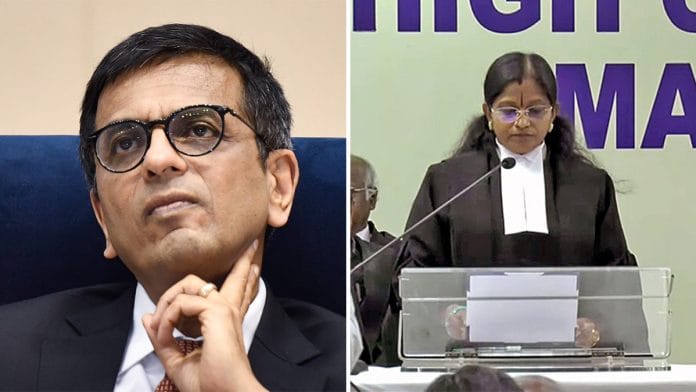New Delhi: Responding to questions regarding the controversial elevation of lawyer Victoria Gowri to the Madras High Court, Chief Justice of India D.Y. Chandrachud — at an event organised by his alma mater Harvard Law School — said reasons for an individual’s appointment as a judge have to do with various aspects of their personality.
Earlier this year, the Supreme Court collegium’s go-ahead to Gowri’s appointment as an additional judge of the Madras HC was immediately challenged on the basis of her political affiliations and statements allegedly constituting hate speech. Gowri took oath in February.
At the Harvard event, the chief justice vigorously defended the collegium’s decision. A video of the event, held in October, has now been put up online by the Harvard Law School Center on the Legal Profession.
The CJI was asked why the Supreme Court was “unable” to withdraw the recommendation of Gowri’s appointment to the Madras High Court. “…Why was the collegium headed by you, at least on the administrative side, not able to withdraw that recommendation, or at least pending further review? Because the bench that you had constituted to look into this case said that despite the representation given to the collegium, you all did not find it necessary appropriate to withdraw that recommendation,” he was asked.
Also Read: From BJP leader &Hindutva activist to Madras HC judge — who is L Victoria Gowri
‘Strong communal bias’
In January, the Supreme Court collegium for high court appointments, which presently comprises the top three judges of the apex court, including the CJI, had recommended Gowri’s elevation from the bar as an additional judge of the Madras High Court.
Soon after various petitions were filed challenging the recommendation. The petitioners contended that when she was an advocate, Gowri was accused of making public statements, amounting to hate speech, and that she was politically affiliated to the ruling Bharatiya Janata Party (BJP). It was also alleged that her statements contained a “strong communal bias”, and her statements disclosed her “revulsion” towards protected religious communities.
It was contended that in light of this and a discovery of strong prejudice, she was ineligible for the judicial office and, therefore, should be restrained from taking oath as a judge of the high court.
The legal grounds that were raised against her appointment at that time included questions on her “eligibility” and the alleged hate speeches delivered by her.
The top court had however rejected the contentions, stating that mere political affiliations are not a ground for disqualification. They had also said that there was no reason to believe that the collegium had not taken her background into account.
In a hearing that took place on the day of her oath-taking ceremony, the SC had refused to interfere with the collegium’s recommendations. “We will be setting a very wrong precedent,” it had said.
‘Heightened level of scrutiny’
Responding to the question at the Harvard Law School event, the CJI said that the collegium comprehensively considers several aspects of an individual’s personality before their appointment as a high court judge and there is a heightened level of scrutiny when it comes to appointments to the judicial office.
In the context of judicial appointments, it is crucial to understand the implications of the collegium’s decisions. The binding nature of high court opinions on the appointment of judges plays a significant role in ensuring that the selection process is both fair and transparent.
“The reasons which may lead us to appoint or not appoint a particular judge individually have to do with the several aspects of the personality of individual judges,” CJI Chandrachud said. “Now, if we start putting out everything about the lives of individuals into the public realm, there’s a grave danger that people would not be willing to accept the judicial office,” he added.
He also said it was difficult to determine strict boundaries as to what disables one from becoming a judge, and one is bound to represent all clients which come to a lawyer for advice.
‘Looked at it very, very carefully’
Chandrachud also said that Justice Gowri’s membership — when she was a lawyer — of the “ruling party” was considered by the court.
“You said that she was a member of a political party. We looked at it very, very carefully,” he said, without elaborating further.
The process of appointment via the collegium system is a “collaborative process” between various stakeholders including state governments, the Centre, the high court, and the Supreme Court, he explained.
The CJI added that some of India’s finest judges have been associated with political parties, citing the example of Justice Krishna Iyer, a pioneering figure in the Indian judiciary, who reformed the Indian criminal justice system. He was associated with the Communist Party of India (CPI).
“My own experience has been that judges who have appeared for a cross-section of diverse political views across the spectrum have turned out to be amazing judges,” the CJI further said.
Chandrachud also pointed out that it might be inappropriate to call out an individual for views they held as lawyers. He added that the judicial office makes one “dispassionate” about the process as the work is constantly evaluated and re-evaluated by civil society and the media.
Akshat Jain is a student of the National Law University, Delhi, and an intern with ThePrint.
(Edited by Gitanjali Das)
Also Read: After ‘anti-minority’ remark row, SC to hear plea against lawyer Gowri’s elevation to Madras HC






